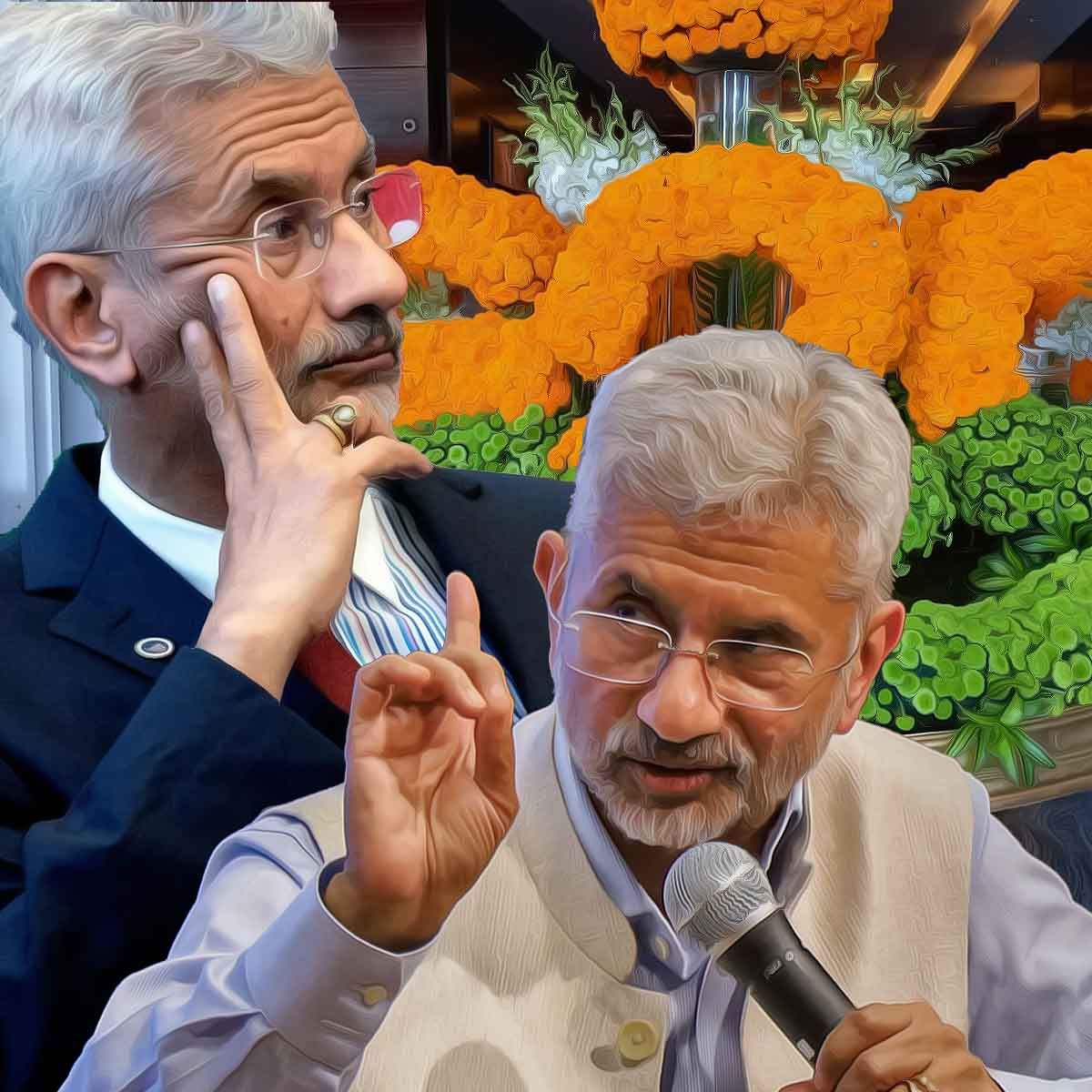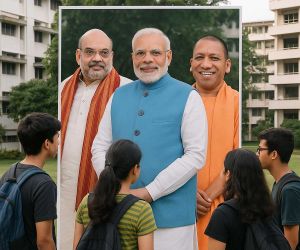MORE COVERAGE
Twitter Coverage
Satyaagrah
Written on
Satyaagrah
Written on
Satyaagrah
Written on
Satyaagrah
Written on
Satyaagrah
Written on
JOIN SATYAAGRAH SOCIAL MEDIA
"When India took the G20 Presidency, the voice of the Global South became paramount": Today’s India doesn't just solve 1/6th of global issues but offers replicable models for the world," Minister S Jaishankar voices India's commitment at the G20 Summit

In an era marked by significant international tensions, evolving economic alliances, and the shared trauma of a pandemic, the world has been seeking a beacon. This Sunday, in the heart of Delhi at the B20 summit, a profound argument was presented by none other than the Minister of External Affairs, S Jaishankar, casting India in a pioneering role, especially for the global south.
|
|
It was not just a declaration, but a vision for the future. Jaishankar began by reminiscing about India's efforts, illustrating the nation's dedication to understanding the problems faced by the countries of the global south. He stated, “India has always endeavored to reach out to these countries to ascertain their problems, ensuring they become the front and center of the G20 agenda under our presidency.” The emphasis was clear – it's time to prioritize the developing nations and ensure they are not just a part of the conversation but at the heart of decision-making.
Jaishankar's address was marked by its grounded realism and sense of purpose. He shed light on the clear imbalance in the global order. This asymmetry, which has always been present, has become even more pronounced after the cataclysmic effects of the COVID-19 pandemic. Developing nations, despite their colossal collective potential, found themselves grappling with challenges magnified by their economic and infrastructural vulnerabilities.
But here's where Jaishankar's vision shined the brightest. He did not just highlight the problems; he showcased India's role as part of the solution. Picturing India as a torchbearer, he made a compelling case for the nation leading the charge in solving the myriad of challenges that the developing world currently faces.
This isn't just about political maneuvering or international diplomacy. At its core, the sentiment resonates with the spirit of India – a nation that has, through its millennia-old history, championed the cause of mutual growth, shared prosperity, and collective well-being.
In the midst of burgeoning global narratives, Minister of External Affairs, S Jaishankar, navigated the contours of an international system that, for decades, has tilted favorably towards the global north. Addressing a room filled with global thinkers and leaders at the B20 summit, he highlighted the elephants in the room: representation and equity.
|
Drawing attention to the overarching reality, Jaishankar eloquently noted, “It is however an undeniable reality that the international system remains dominated by the global north. This is naturally reflected in the composition of G20 as well.” For many in the room, this might have been a known fact, but having it placed center-stage by a top diplomat resonated differently. It was a bold move, pinpointing a structural imbalance that many choose to sidestep.
There was a time when globalization was viewed as a panacea, a universal solution that would, by its very nature, usher in widespread opportunities and bridge gaps. However, as Jaishankar aptly pointed out, the sheen of globalization began to fade as its inequities and unevenness surfaced. The COVID-19 pandemic further spotlighted these discrepancies, revealing the stark vulnerabilities of developing nations. Jaishankar’s words echoed this sentiment, “...as its inequities & unevenness became more apparent & then as we saw the Covid pandemic take a horrific toll across the world, the need to focus on developing countries became more compelling…”
Diving deeper into the issue, Jaishankar underscored the minimal representation of the Global South within influential groups like the G20. For the uninitiated, the Global South encompasses regions that have, for the most part, been on the peripheral edges of global discussions — areas spanning Africa, Latin America, and the Caribbean, parts of Asia, and specific regions of Oceania.
But Jaishankar's address wasn’t merely about highlighting issues; it was also about action. He shared how, under India's G20 presidency, the nation actively reached out to the countries of the Global South. The purpose? To truly understand their unique challenges, and aspirations, and to ensure that their concerns were not just heard, but amplified, becoming a focal point of the G20 agenda.
In the corridors of international diplomacy, this approach marked a shift. India was not only leading by example but was championing a cause that resonated with nations that had felt unheard of for far too long. The message was clear: Every nation, regardless of its economic prowess or historical significance, has a voice that deserves to be heard.
In a world dominated by powerhouses and traditional stalwarts, the voice of the Global South has often been a mere whisper, lost in the cacophony of bigger players. However, India's recent G20 presidency displayed a marked departure from this norm, underscoring a fresh, more inclusive approach.
Taking the podium, the Minister of External Affairs, S Jaishankar, showcased India's sensitivity and commitment to the broader global community. With a tone laden with gravitas, he declared, “When India assumed the G20 Presidency last December, we were acutely conscious that most of the global south would not be at the table when we meet, this mattered very much…” For the keen observer, this was not just diplomatic speak; it was India's pledge to amplify voices that had long been stifled.
Recognizing this disparity and in a pioneering move, the Prime Minister convened the "Voice of the Global South Summit" in January. This wasn’t merely a gesture; it was a deliberate act, ensuring that the challenges and priorities of these nations weren’t just discussed in the peripheries but were embedded at the heart of G20 deliberations. As Jaishankar pointed out, these voices were made “central to the G20 agenda."
Articulating a broader vision for the G20, Jaishankar emphasized its core mandate: promoting economic growth and development. He was, however, quick to point out a stumbling block. “The core mandate of the G20... cannot advance if the crucial concerns of the global south are not addressed.” Historically, due to an array of reasons spanning from scale, subsidy, and technology, to strategic choices, the global south had been relegated to a consumer role rather than being empowered as a producer.
India's journey, as painted by Jaishankar, showcases a different narrative. A land of over a billion dreams, the nation is now a thriving crucible where experimentation melds seamlessly with innovation, where scale meets breakthroughs. Highlighting this transformative journey, he asserted, “Today’s India is the one where the world simultaneously witnesses experimentation, scaling up, deployment, innovation, & breakthroughs.” But why is this important? Jaishankar elucidates, “I stress these developments not only because they solve 1/6th of the world’s problems, but because they provide replicable models for the rest of the global south.”
In wrapping up, it's evident that India's stance on the global stage has transcended mere rhetoric. The nation is stepping up, not just for itself, but as a beacon for the Global South, emphasizing collaboration, inclusivity, and shared progress. This, in essence, captures the soul of a new India – one that is grounded in its traditions but fiercely forward-looking, seeking to craft a more equitable future for all.
 Support Us
Support Us
Satyagraha was born from the heart of our land, with an undying aim to unveil the true essence of Bharat. It seeks to illuminate the hidden tales of our valiant freedom fighters and the rich chronicles that haven't yet sung their complete melody in the mainstream.
While platforms like NDTV and 'The Wire' effortlessly garner funds under the banner of safeguarding democracy, we at Satyagraha walk a different path. Our strength and resonance come from you. In this journey to weave a stronger Bharat, every little contribution amplifies our voice. Let's come together, contribute as you can, and champion the true spirit of our nation.
 |  |  |
| ICICI Bank of Satyaagrah | Razorpay Bank of Satyaagrah | PayPal Bank of Satyaagrah - For International Payments |
If all above doesn't work, then try the LINK below:
Please share the article on other platforms
DISCLAIMER: The author is solely responsible for the views expressed in this article. The author carries the responsibility for citing and/or licensing of images utilized within the text. The website also frequently uses non-commercial images for representational purposes only in line with the article. We are not responsible for the authenticity of such images. If some images have a copyright issue, we request the person/entity to contact us at This email address is being protected from spambots. You need JavaScript enabled to view it. and we will take the necessary actions to resolve the issue.
Related Articles
- "Peace has its victories no less than war, but it doesn't have as many monuments to unveil": Jaishankar slammed Pakistan after it rakes up Kashmir issue in UN, "a country that hosts Osama and launches attack on India’s parliament don't have credentials"
- "लो, कर लो बात": Dr. S. Jaishankar exposes the irony of Western media - quick to critique yet slow to reflect, as they litigate their own elections and still presume to lecture India on democracy, a nation with strong voter turnout and vibrant democracy
- Amid deteriorating India-Canada relations, EAM Jaishankar underscores the paramountcy of diplomat safety in Canada, citing violations of the Vienna Convention, emphasizes potential visa resumption contingent on diplomats' safety assurance in Ottawa
- "Best time for you to hold your tongue is the time you feel you must say something or bust": Without mincing any word, EAM Jaishankar busted Pakistani spin, "World is not stupid & world does call out countries who indulge in terrorism, clean up your act"
- 21 years after Kargil, we reflect on how Israel's pivotal military support proved to be the game-changer, providing the edge India needed to hammer back Pakistani aggressors and emerge victorious, a conflict that marked watershed in Indo-Israeli relations
- Ministry of External Affairs summons South Korea Ambassador over the pro-terror stance of Hyundai Pakistan on Kashmir and expressed strong displeasure of the Government: Korean Minister Yong exhibit regret
- We also have views on other people's human rights, particularly when it pertains to our community," Jaishankar retorted in one of the strongest repudiation of the constant American lectures on human rights
- Minister for External Affairs Dr. S Jaishankar pointed at Raisina Dialogue that 'It is better to engage the world on the basis of who we are, rather than how we are perceived and try and please the world'
- "New dynamism in ties": In Jakarta, PM Modi calls for a new rules-based order in the post-Covid era, emphasizing the critical role of the ASEAN-India partnership in shaping the resurgence of Asia in the 21st century and fostering global growth
- Foreign minister S Jaishankar hits back at Rahul Gandhi for talking against Indian government and criticising MEA officials for disagreeing with Europeans, says ‘It is confidence, not arrogance’
- "Justice Pursued": In a major diplomatic stride, India secures consular access for ex-Navy officers in Qatari Custody; MEA's active role and PM Modi's high-level talks with Qatar Emir reinforce the commitment to justice & strengthen India-Qatar relations
- "Only in growth, reform, and change, paradoxically enough, is true security to be found": EAM S Jaishankar underlined India’s stance, "United Nations will become ‘irrelevant’ without reforms, it's a hard nut to crack, but hard nuts can be cracked"
- Showing West Mirror once again, Dr. Jaishankar asked, 'which part of rules-based order justifies the world’s actions in Afghanistan': Pointed out how the entire Afghanistan was thrown under the bus by world last year
- Bangladesh and India put the final nail in the coffin of China’s ‘String of Pearls’ with access to Chittagong port as it was offered by PM Sheikh Hasina for use by India for trade and uninterrupted commerce
- "Every wave, regardless of how high and forceful it crests, must eventually collapse within itself": The deal, India’s biggest and most ambitious free trade agreement in trouble after home secretary Suella Braverman made comments about ‘visa overstayers’

























